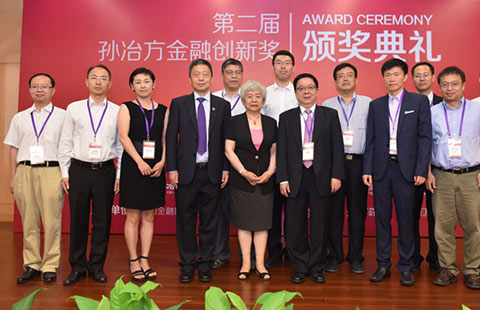Vanke power battle heats up as Baoneng buys more shares
By Zhu Wenqian (China Daily) Updated: 2016-07-07 08:08
 |
|
A man walks out of a China Vanke development in Tianjin. [Photo/China Daily] |
Latest twist in the corporate power struggle fans increased speculation, uncertainty
Shares of China Vanke Co Ltd rose on Wednesday after its largest shareholder, financial conglomerate Baoneng Group, upped its stake the previous day in the country's biggest residential developer, in the latest twist in a high-profile corporate struggle for control.
Baoneng bought more than 78.39 million Vanke A shares, or a 0.71 percent additional stake, on Tuesday and Wednesday, Vanke said in a regulatory filing on Wednesday. That brought the company's total holding in Vanke to 25 percent.
According to the Securities Law, if Baoneng's shareholding reaches 25 percent, it will have to make a public statement and it will be unable to buy more Vanke shares in the two days following the notice. If its holding rises to 30 percent, then it will have to make a general offer to other shareholders.
On Wednesday, Vanke's shares climbed nearly 5 percent in morning trading.
The advance lost steam later and it closed at 19.8 yuan ($2.96), edging up 0.05 percent on the day. But that was after the stock plunged by the 10 percent daily limit the previous two days. The trading of mainland-listed Vanke resumed on Monday after a six-month suspension.
Turnover of Vanke A shares on Wednesday was worth 20.1 billion yuan, a record high in the 25 years the company has been publicly traded. Vanke's Hong Kong-listed H shares, however, have tumbled about 30 percent in the year to date.
Last week, Baoneng proposed to oust the entire management team of Vanke. The proposal was seen as China's most high-profile corporate power struggle, and the latest share purchase added more uncertainty and speculation to the issue, analysts said.
The development followed the announcement by Vanke's management of a $6.9 billion deal with Shenzhen Metro Group, to dilute the holdings of Baoneng and State-owned China Resources (Holdings) Co.
Liu Junhai, a professor of civil and commercial law at Renmin University of China, said such maneuvers involving major shareholder controlling rights should be done cautiously.
"It's hard to predict whether Baoneng will continue to increase its stake and go higher than 30 percent, as everything is changing," he added.
Last week, the China Securities Regulatory Commission said it was closely following developments and all parties involved must abide by regulations.
- Baoneng lifts stake in China Vanke, fuels speculation of hostile bid
- Vanke takeover battle highlights market regulation defects
- Analysts: Vanke's shares to rebound after 20-30% correction
- China Vanke to resume trading after months-long power struggle
- Vanke's 2nd largest shareholder opposes plan to oust all directors
- JinkoSolar eyes power plants in new market
- Mongolia company enables self sufficiency in steel tubes
- GDP revision reflects real picture of China's economy
- Europe should focus on attracting Chinese investment: expert
- China's tourism investment surges in H1
- Chinese steel plants bounce back after destocking
- World Bank member launches public-private partnership with Chinese city
- Bank of China issues $3 billion equivalent green bond


















